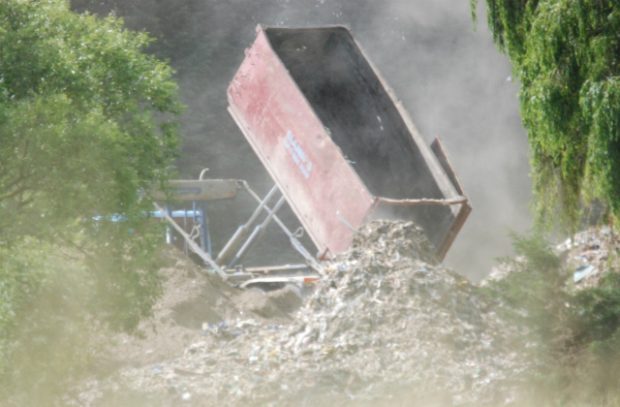Increased fines, new powers for councils and multi-agency unit will crack down on fly-tipping

This morning BBC News Online published an article on fly-tipping highlighting how organised crime has led to an increase in waste dumping across the UK. BBC Breakfast, BBC 5 Live and local BBC radio stations also covered the story.
BBC Breakfast and BBC radio carried an interview with the Environment Agency’s Midlands area manager Marc Lidderth, who explained the scale of the challenge and the key actions the agency is taking to crack down on fly-tipping, including the creation of the Joint Unit for Waste Crime. However, online copy has not reflected the extensive information provided to the reporters working on this story.
Serious and organised waste crime is estimated to cost the UK economy at least £600 million a year. The EA is responsible for tackling large-scale, illegal dumping incidents and is determined to make life hard for criminals by disrupting and stopping illegal activity through tough enforcement action and prosecution.
In the last year the EA has closed down over 900 illegal waste sites, brought forward 113 prosecutions and launched a Joint Unit on Waste Crime to bring down the most serious and organised criminal groups.
Alongside the EA, the Joint Unit is comprised of the National Crime Agency, the police, HMRC, Natural Resources Wales and the Scottish Environment Protection Agency to ensure that criminals who are using the waste industry for profit or to facilitate money laundering and people trafficking will be brought to justice, no matter which part of the country they are operating in.
Councils are able to issue on-the-spot fines to fly-tippers and now have stop, search and seize powers for vehicles suspected of fly-tipping. Councils and the EA can also issue £400 fines to householders who do not pass their waste to a licensed carrier which is then found fly-tipped.
Local authorities carried out 2,397 prosecutions for fly-tipping offences in 2018/19, an increase of 7% on 2017/18; over 96% of prosecutions resulted in conviction. The number of fixed penalty notices issued has continued to increase, up 11% to 76,000 from 2017/18.
An Environment Agency spokesperson said:
Waste crime is an unacceptable blight on our environment, estimated to cost the UK economy at least £600 million a year and put communities at risk.
We are determined to bring waste criminals to justice, which is why anyone found guilty could face jail time or a hefty fine.
In the last year, we closed down over 900 illegal waste sites, brought forward 113 prosecutions and launched a Joint Unit on Waste Crime to bring down the most serious and organise criminal groups.
Follow Defra on Twitter, and sign up for email alerts here.
How the Environment Bill will deliver on our green ambition

Today (Thursday 13 February), the Times’s legal supplement The Brief carries a piece analysing our recently-introduced Environment Bill.
While the piece recognises the ambition of the Bill, it also contains a number of points about the targets and governance framework included in it. These mainly come from ClientEarth who question whether the framework will adequately replace what’s in place in EU law, and if the new watchdog, the Office for Environmental Protection (OEP), will be independent.
We’re clear the UK will continue to lead the world on the environment and our three landmark Bills – the Environment Bill, Agriculture Bill and Fisheries Bill - will be the cornerstone of this work.
The OEP will scrutinise government’s progress in improving the natural environment, as well as the implementation of environmental law; it will offer a free-to-use complaints system, respond to complaints about public authorities’ delivery of environmental law and enforce the delivery of environmental law, including climate change law, where necessary.
And it will be truly independent. It will have the power to undertake its own investigations at its own instigation, and will be able to take central government and public bodies to court for any serious breach of environmental law, if necessary. Crucially, Ministers will not be able to set the OEP’s programme of activity or improperly influence its decision-making.
The OEP will come into effect from January 2021, subject to the passage of the Environment Bill.
The Times’ piece rightly notes the enhanced Bill introduced to Parliament in January will mean ministers have to make a statement in Parliament when any new bill reaches its second reading, explaining how it maintains or enhances the level of environmental protection provided by existing environmental law.
This will work alongside other measures in the Bill to give Parliament the information it needs on environmental protections in future legislation.
We are clear that the UK should not bind itself to the legislative systems of the past and those of the European Union it is leaving. We want to go further and be better on environmental protection and realise the benefits to the UK environment of leaving the EU.
The piece also questions whether this Government will follow through on its pledge to stop exports of polluting plastic waste to non-OECD countries.
The Bill creates the legislative power to allow the government to deliver on this manifesto commitment. This will be a big change for industry which will bring real benefits to the environment around the world. It is therefore only right that we consult with industry, NGOs, and local authorities on specific restrictions or prohibitions and timescales for implementing them.
Read more about the Environment Bill on gov.uk or the Environment Bill’s page on parliament.uk.
2 comments
Comment by Jopseh Russo posted on
I should assert barely that its astounding! The blog is informational also always fabricate amazing entity.. https://999plumber-bracknell.co.uk/plumbers-in-wokingham
Comment by Jopseh Russo posted on
I should assert barely that its astounding! The blog is informational also always fabricate amazing entitys <b><a href="https://999plumber-bracknell.co.uk/plumbers-in-wokingham">Boilers in Wokingham</a></b>